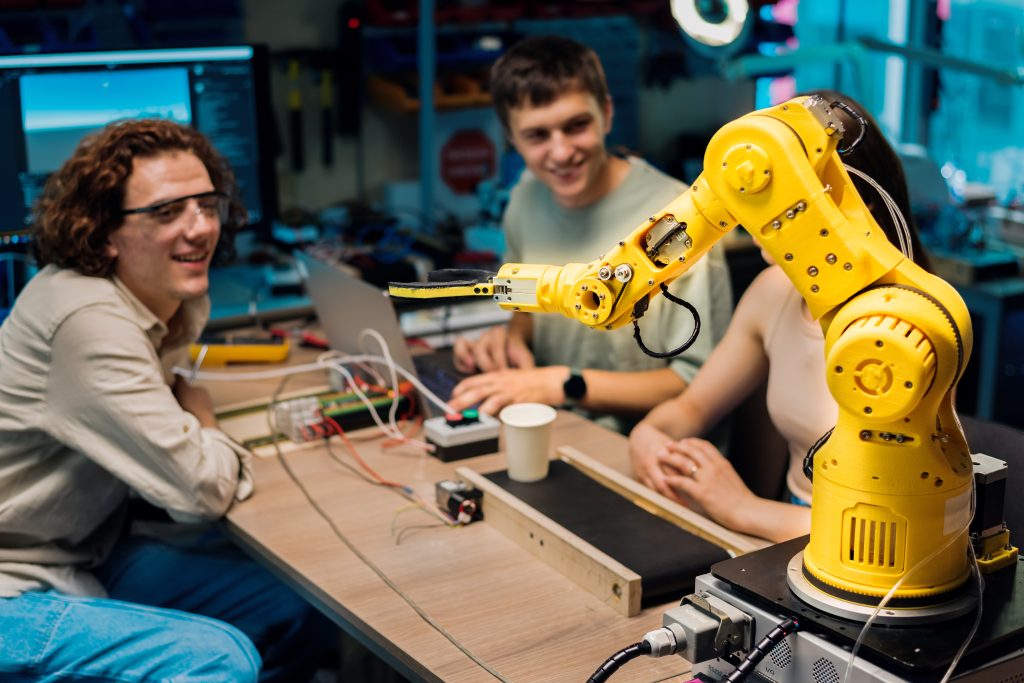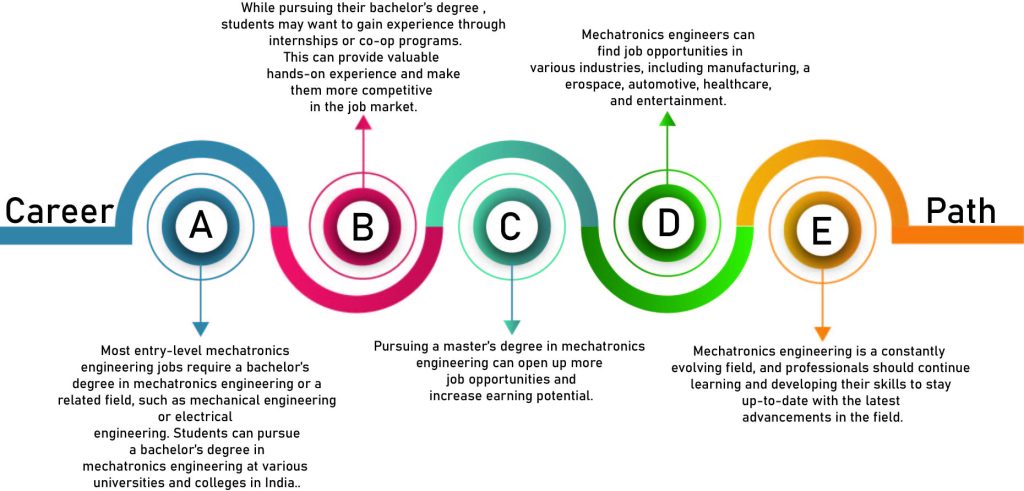Mechatronics engineering is an interdisciplinary field that combines principles from mechanical engineering, electrical engineering, and computer science to design and develop intelligent systems and machines. Mechatronics engineers work on a variety of projects, including robotics, automation, control systems, and embedded systems. The goal of mechatronics engineering is to create more efficient and effective systems that improve the quality of life and enhance productivity in various industries.

Work description
A mechatronics engineer’s work description typically involves designing, developing, testing, and maintaining complex systems that integrate mechanical, electrical, and computer technologies.
This can include designing and building robotic systems, automated machinery, and other intelligent devices that perform a variety of tasks.
Mechatronics engineers also work on control systems that regulate the motion, speed, and positioning of mechanical components, and they develop algorithms and software to control these systems.
In addition, mechatronics engineers often collaborate with other engineers, technicians, and project managers to ensure that their designs meet project requirements, budget constraints, and quality standards.
High Demand
With the increasing use of automation and robotics in various industries, there is a growing demand for mechatronics engineers who can design and maintain these systems.
Lucrative salaries
Mechatronics engineers can work in a variety of industries, including manufacturing, aerospace, automotive, healthcare, and entertainment, among others.
Opportunities for innovation
Mechatronics engineering requires knowledge and skills from multiple fields, making it a challenging and intellectually stimulating career path.
Versatility
Mechatronics engineers typically earn a high salary due to their specialized skills and the demand for their expertise.
Flexibility
Mechatronics engineers have the opportunity to create new technologies and push the boundaries of what is possible with intelligent systems.
Job satisfaction
Mechatronics engineering involves solving complex problems and developing creative solutions, making it a rewarding career for those who enjoy a challenge.
High stress
Mechatronics engineers often work on projects with tight deadlines and high stakes, which can create pressure to perform.
Long hours
Due to the rapid pace of technological change, mechatronics engineers must continuously learn new skills and stay up-to-date with the latest developments in their field.
Competitive field
Mechatronics engineering projects can be very complex, requiring attention to detail and the ability to manage multiple components and systems.
Constant learning
The field of mechatronics engineering is competitive, and job opportunities may be limited in certain regions or industries.
Isolation
The high-pressure and fast-paced nature of the work can lead to burnout for some mechatronics engineers.
Eye strain and other physical health issues
Mechatronics engineering requires advanced knowledge and skills in multiple fields, which can make it a difficult career path for some individuals to pursue.
The cost of pursuing a career in mechatronics engineering in India can vary depending on the type of institution and program you choose, as well as factors such as location, accommodation, and personal expenses.
The cost of a four-year bachelor’s degree in mechatronics engineering in India can range from approximately Rs. 5 lakhs to Rs. 20 lakhs depending on the institution.
The cost of a two-year master’s degree in mechatronics engineering in India can range from approximately Rs. 1 lakh to Rs. 10 lakhs depending on the institution.
Short-term certification courses in mechatronics engineering can cost anywhere from Rs. 10,000 to Rs. 1 lakh depending on the institution.
Additionally, living expenses such as accommodation, food, and transportation can vary depending on the location and lifestyle of the student.
[wpcharts type=”horizontalbarchart” bgcolor=”red:gray:yellow,blue:gray:yellow,random:gray:yellow,purple:gray:yellow” min=”0″ legend=”true” titles=”2 year , 5 year” values=”3,7,5,12″]
The earning potential of a mechatronics engineer in India can vary depending on factors such as level of education, experience, job location, and industry. However, on average, a mechatronics engineer in India can earn anywhere from INR 3 lakhs to INR 20 lakhs per year.
The starting salary for a mechatronics engineer with a bachelor’s degree can range from INR 3 lakhs to INR 6 lakhs per year, while those with a master’s degree or more experience can earn significantly more.
Mechatronics engineers working in industries such as automotive, aerospace, and defense typically earn higher salaries.
[wpcharts type=”horizontalbarchart” bgcolor=”red:gray:yellow,blue:gray:yellow,random:gray:yellow,purple:gray:yellow” min=”0″ legend=”false” titles=”Entry-Level, Mid-Career, Senior-Level ” values=”5,15,25,35,45,55″]
Strong foundation in mathematics, physics, and computer science.
Curiosity and eagerness to learn about new technologies and systems.
Attention to detail and ability to work with precision.
Strong analytical and problem-solving skills.
Good communication and teamwork abilities.
Creativity and innovation.
Weakness in mathematics and physics.
Lack of interest in technology and computer systems.
Poor attention to detail and lack of precision.
Weak analytical and problem-solving skills.
Poor communication and teamwork abilities.
Resistance to change and innovation.
Work-life balance
The work-life balance of a mechatronics engineer can vary depending on the specific job and industry.
Generally speaking, mechatronics engineers can have a good work-life balance as many work in regular office hours and rarely have to work overtime.
However, those in the manufacturing industry may have to work shifts and may be required to work weekends or holidays. Additionally, those in research and development may have more flexible schedules but may need to work longer hours during peak project times.
Overall, mechatronics engineering can offer a good work-life balance, but it is important for individuals to find a job and industry that aligns with their personal and professional goals.

Advancements in mechatronics engineering have led to the development of innovative products and systems that improve the quality of life for individuals, such as assistive technologies for people with disabilities.
Mechatronics engineering has contributed to the automation and optimization of manufacturing processes, increasing efficiency and reducing costs for companies.
The field of mechatronics engineering has created new job opportunities for individuals with diverse skill sets, including those in mechanical engineering, electrical engineering, and computer science.
Mechatronics engineering has played a key role in the growth and development of industries such as automotive, aerospace, healthcare, and entertainment.
Mechatronics engineering has the potential to contribute to sustainable development by improving the efficiency and sustainability of energy systems and reducing waste in manufacturing processes.
Mechatronics engineering has the potential to address global challenges such as climate change and healthcare by developing new technologies and systems that can mitigate these challenges.
Control systems
Involves designing and developing systems that control the behavior of machines and processes, using sensors, actuators, and control algorithms.
Robotics & Automation
Involves designing and developing robots and robotic systems, such as industrial robots, service robots, and medical robots.
Embedded systems
Involves designing and developing hardware and software systems that are embedded in other devices, such as microcontrollers and senso
Electromechanical Systems:
Involves designing and developing electromechanical systems, such as electric motors, generators, and transformers.
Artificial intelligence and machine learning
Involves using AI and machine learning techniques to design and develop intelligent systems, such as autonomous vehicles and smart factories.
Conclusion:
In conclusion, mechatronics engineering is a highly interdisciplinary field that offers diverse career opportunities for individuals interested in technology, automation, and innovation. With the increasing demand for smart and efficient systems across industries, mechatronics engineers are well-positioned to play a crucial role in designing and developing the next generation of products and systems. Whether working in robotics, control systems, or artificial intelligence, mechatronics engineers can make a significant impact on society and contribute to solving some of the world’s most pressing challenges.



